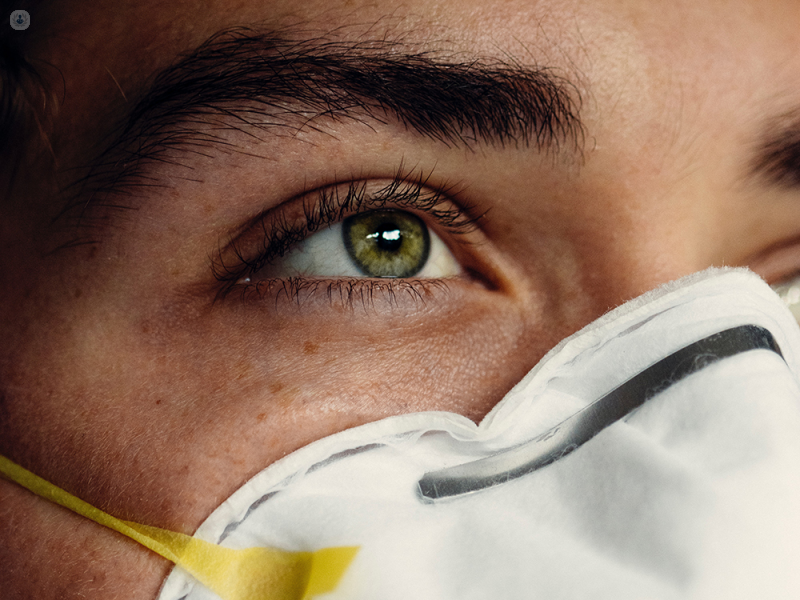COVID-19 and age-related macular degeneration (AMD)
Written by:COVID-19 is the biggest health emergency we have faced in a generation. We are still learning about the virus and how it affects the body, and our knowledge continues to improve with the recent breakthrough of a potentially effective vaccine from Pfizer and BioNTech. In this article, London ophthalmologist, Mr Praveen Patel illustrates how the COVID-19 pandemic has presented a unique challenge to patients with AMD and how these patients can continue caring for their eye health during these difficult times.

How does COVID-19 impact eye health?
The eyes are rarely affected by COVID-19 but there have been cases of red-eye or conjunctivitis in some patients with this disease, and some reports of watery eyes too. Most cases of red-eye are caused by other infections or allergy.
Relatively few people have redness or watery eyes with COVID-19. The biggest way COVID-19 affects eye health is through indirect effects, which lead to people with sight-threatening eye conditions being unable to receive the treatment they need for their eye condition. This might be because they are suffering from the effects of COVID-19 or because of long referral time to be seen in hospital eye clinics.
Can macular degeneration increase the severity of COVID-19?
Although age-related macular degeneration (AMD) doesn’t increase the severity of COVID-19, people suffering from this viral disease can experience worsening wet AMD if treatment with eye injections such as Eylea or Lucentis is delayed.
I have wet AMD, can I still see my doctor during this time?
Yes, patients with wet AMD should be continued to be seen by their ophthalmologist so they can continue to receive regular injection treatments.
Research shows that the best results from Eylea or Lucentis injections are when patients receive regular treatment when the disease is active, with the gap between injections increased as the wet AMD becomes more stable. Even after the blood vessel leak (choroidal neovascularisation) associated with wet AMD stabilises, we know that most people with wet AMD still have evidence of blood flow in the area of wet AMD. This means that the majority of patients with wet AMD still need to be monitored 5-7 years after they start treatment in case they need to continue or restart Eylea injections.
How can dry and wet macular degeneration be managed at home during COVID-19?
Age-related macular degeneration is the biggest cause of irreversible sight loss in the UK. More information can be found in some of my other articles as well as from Macular Society and RNIB webpages.
We can all make lifestyle changes to reduce the risk of age-related macular degeneration (AMD). Smoking is a big risk factor for AMD so this provides us all with another good reason not to smoke. I also make sure patients have a diet rich in green vegetables, and those at highest risk from sight-loss may also want to consider taking nutritional supplements. These contain a combination of antioxidants that were used in the AREDS2 clinical trial. You can find more information by looking at one of my previous articles and also by looking at the RNIB webpage or the Macular Society Nutrition and Health leaflet.
For patients with dry AMD, I recommend they self-test their vision at home to look for new symptoms such as worsening distortion or dark patches. For patients receiving eye injections for wet AMD, it’s important to have regular visits to the hospital eye clinic to have retinal optical coherence tomography (OCT) scans done and vision tests to make sure the wet AMD is stable. If patients notice distortion or worsening of their vision, which happens rapidly over days, then they should contact their eye clinic in case they need to be seen sooner to have another injection.
I'm in the high-risk group for COVID-19. I have noticed a change in my vision and I also have dry AMD - is it ok to see an eye doctor?
Hospital and eye clinics take great precautions to minimise the spread of COVID-19, and so it is safe for patients to come to the hospital to see an eye doctor. This is particularly important if people notice a change in their vision and think it could be due to AMD.
There are several ways to book to see me in London or Hertfordshire and since the national COVID-19 lockdown in the UK, I have started seeing patients with AMD again. In some cases, I had to start treatment for wet AMD as the reason for sight-loss turned out to be the start of wet AMD rather than changes due to dry AMD.
It’s particularly important for people over 55 years of age who develop a change in their vision to see an eye doctor in case they have AMD. Also, it is not easy to tell whether someone has wet or dry AMD without doing a retinal optical coherence tomography (OCT) scan. This can only be done at well-equipped optician practices or in eye clinics such as where I work - The Rivers Hospital, Moorfields Private or London Medical.
If you would like to make an appointment with Mr Praveen Patel, head on over to his Top Doctors profile today.


